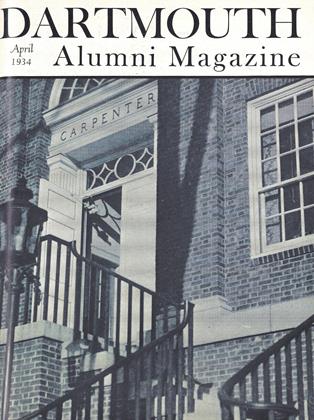THE ACCOMPANYING PICTURE was taken in the Vale of Tempe in the winter (note snowshoes) of 1907. George Elliott (Red) Shipley, the Hanover athletic records of the day will show, was one of Dartmouth's best quarter milers. His duel with Taylor, the colored runner of the University of Pennsylvania who broke records, was one of the classics of Mechanics Hall in Boston in the old days. Well the writer remembers the slivers which covered Red's side one day when he returned to Hanover after colliding with Taylor and spilling on one of those indoor board tracks.
Red was an Alpha Delt, Turtle, C. & G., member of Palaeopitus and vice-president of 1908 its senior year. The last time the writer saw him was in front of the Edgewater Beach Hotel, Chicago, in the Spring of 1912. Red was an Oak Park High School graduate and, in 1912, he was working for the Western Electric at Hawthorne, Ill. That day on the lake shore we sat on a log and tried to peer into the future. Later, Red joined a field artillery unit of the Illinois National Guard and went to the Mexican border in 1914. When the World War started, Red was already proficient in the School of the Soldier and liked it. It was characteristic of him that he obtained an officer's commission in the first of the officers' training schools which the Government set up in the summer of 1917. He went through the Fort Sheridan school and then did instructional duty at Camp Grant, Ill., Camp Johnston, Fla., Camp Meade, Md., going overseas in the Spring of 1918. While some of the classmates, the writer included, were attending the solemn tenth reunion in Hanover, Red was in France.
George Elliott Shipley, Dartmouth '08, was killed in the Argonne offensive on October u, 1918, two days before the 34th anniversary of his birth. He was leading a detachment of infantry which had lost all of its officers and had no one to guide it until Red came along in an attack near Nantillois, three miles from Mt. Faucon. His chaplain wrote that Red was instantly killed and was buried in his own blanket, where he fell, while the fighting was still going on.
Now Red was a lieutenant in the quartermaster's corps on October 11, 1918, and thereby hangs a tale of heroism. As the story goes, this lieutenant was engaged in carrying out some sort of non-combative orders in the vicinity of the fighting lines. While on his way, he observed a detachment of infantry in difficulty. As he watched he saw the group was apparently without an officer. He verified his suspicions, rushed into the thick of the battle, learned the objective of the confused group, led them to it. In doing so, Red disobeyed his orders. After the battle, he was reported as missing from his outfit. Later, the record was straightened out and Red was highly commended for his bravery.
It was always the impression of the writer that Red had received a Government citation for his heroism, but his case turns out to be one which was pigeonholed, either through inadvertence or red tape. Application was made to the War Department for official recognition on behalf of Red. After long delay, it was said in Washington that the application had been received by the authorities "too late for a hearing." But Red's soul goes marching on and, I hope, if any of the Dartmouths, no matter which class, ever gets in the White House, he will take time out, go over to the War Department and procure the recognition Red's heroism so obviously deserves.
George E. Shipley 'OB In recognition of a hero.
 View Full Issue
View Full Issue
More From This Issue
-
 Class Notes
Class NotesClass of 1918
April 1934 By Allan C. Gottschaldt -
 Article
ArticleHANOVER BROWSING
April 1934 By Rees H. Bowen -
 Class Notes
Class NotesClass of 1910
April 1934 By Harold P. Hinman -
 Class Notes
Class NotesClass of 1908
April 1934 By Laurence W. Griswold -
 Class Notes
Class NotesClass of 1930
April 1934 By Albert I. Dickerson -
 Class Notes
Class NotesClass of 1923
April 1934 By John C. Allen









